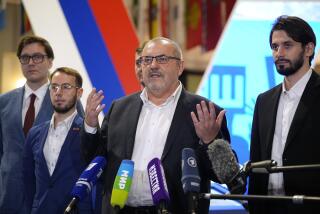For Ex-General, Path to Kremlin May Lie in a Detour to Siberia
- Share via
MOSCOW — In the strange world of Russian politics, moving to a remote corner of Siberia can be the best formula for amassing power in Moscow.
Such is the case for retired army general and ousted Security Council chief Alexander I. Lebed, who has launched his campaign for the presidential race in 2000 by announcing that he will run for governor of the Krasnoyarsk region in April.
Lebed, who was fired by President Boris N. Yeltsin 16 months ago, is widely thought to be seeking the Krasnoyarsk leadership in order to gain the seat on the Federation Council, Russia’s upper house of parliament, that comes with it.
From that soapbox, the 47-year-old maverick with a penchant for folksy witticisms may have a chance to recover the place in Russia’s ever-shifting national limelight that he occupied for a few months in 1996. Back then, his support proved the key to reelecting Yeltsin and negotiating a shaky peace settlement in Chechnya.
But in announcing his gubernatorial bid in a distant and sparsely populated region he has never lived in--there are no residency requirements--Lebed insisted this week that his ambitions are focused solely on Krasnoyarsk.
“All those stupid things ascribed to me--that this would be a proving ground for me, or that I could take advantage of the people there--it’s just nonsense,” Lebed told journalists. “I am going to Siberia to work.”
Krasnoyarsk is home to 3 million people, or about 2% of Russia’s population, but it covers territory one-fourth the size of the U.S., stretching from near the Mongolian border to the Arctic Circle. The region hosts the world’s biggest nickel producer, Norilsk Nickel, as well as strategic metal-processing plants. But like most resource-rich areas of ineptly administered Russia, living standards are low and wealth is concentrated in the hands of a powerful few.
Lebed acknowledges that he faces tough competition for the governorship from incumbent Valery Zubov and a Communist contender, Pyotr Romanov.
But in his favor is support from the neighboring Khakassia republic, where his younger brother, Alexei, is governor.
“Other candidates won’t have the slightest chance,” Alexei Lebed told Interfax news agency.
But at the time of his announcement, Alexander Lebed displayed what one newspaper termed “an amazing level of ignorance” about the region. Asked to assess a power-sharing agreement signed in November apportioning rights between Moscow and Krasnoyarsk, Lebed looked baffled, then conceded that he had not read it.
Also, Lebed’s entourage has undergone dizzying change.
“Lebed’s opinions directly depend on the viewpoints of those who write his political programs, and since Lebed changes his ideologists quite often, his convictions change often as well,” the respected daily Kommersant observed.
“His team is something obscure, nebulous and extremely unstable,” echoed Vyacheslav Nikonov, head of the Politika Fund think tank.
Financing for Lebed’s next political venture is also uncertain. He attracted support from Moscow bankers for his 1996 presidential bid, but only after Yeltsin strategists decided that he could be swayed to their camp in a runoff. Lebed placed third behind Yeltsin and Communist Party challenger Gennady A. Zyuganov, and later pledged his backing to Yeltsin for the decisive second round.
But it is now in the Kremlin’s interest to keep Lebed out of the Krasnoyarsk post, because if he loses, he would probably be relegated to political obscurity well ahead of the next presidential race.
Russian media, however, have hinted that Lebed may win industrialist Boris A. Berezovsky’s backing. Berezovsky could shape Lebed’s populist talents and infuse savvy economic policy into the regional ticket and the 2000 race.
An alliance with Lebed could also allow Berezovsky to settle a score with rival magnate Vladimir O. Potanin, whose holdings include Norilsk Nickel. From the seat of the regional government, Berezovsky and Lebed could create havoc for Potanin.
(BEGIN TEXT OF INFOBOX / INFOGRAPHIC)
Profile: Alexander I. Lebed
* Age: 47
* Education: 1973 graduate of Ryazan Higher School of Airborne Forces, 1985 graduate of Frunze Military Academy
* Career: Battalion commander in Afghanistan, 1981-82; commander of 14th Army in Trans-Dniester region, 1992; discharged from active service, 1995. Elected state Duma deputy, December 1995; finished third in presidential race, June 16, 1996; resigned Duma seat to head National Security Council, June 18, 1996; fired from Security Council, October 1996.
* Quotes: On his critics: “The dog barks, but the caravan passes.” On the economy: “One finds free cheese only in a mousetrap.”
Source: Carol J. Williams
More to Read
Sign up for Essential California
The most important California stories and recommendations in your inbox every morning.
You may occasionally receive promotional content from the Los Angeles Times.














